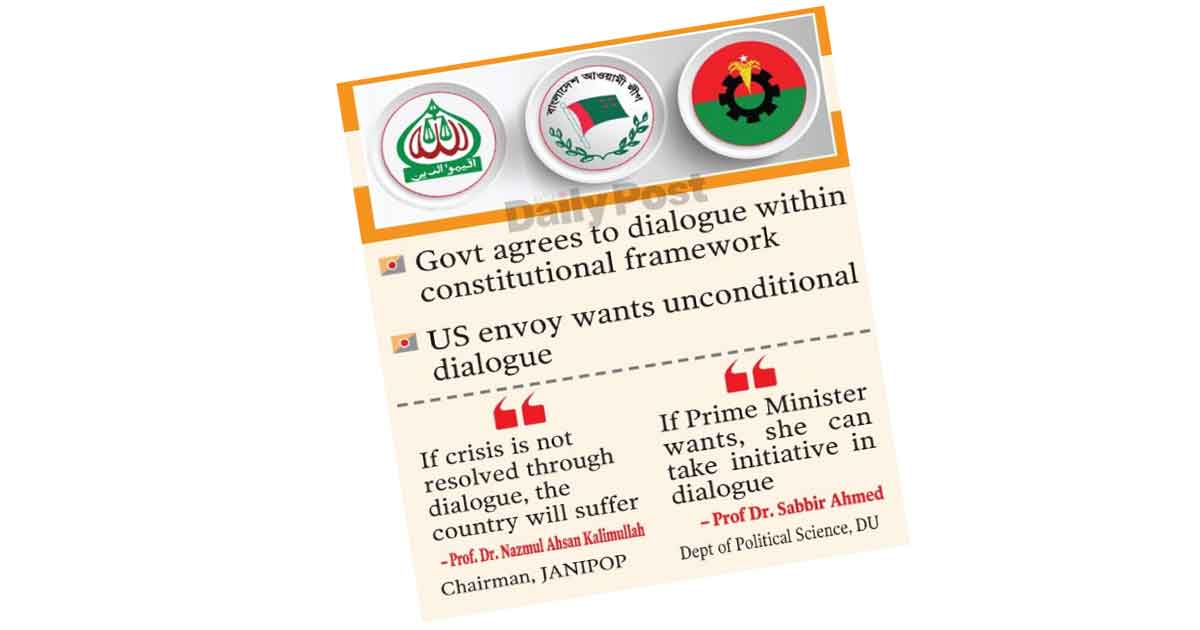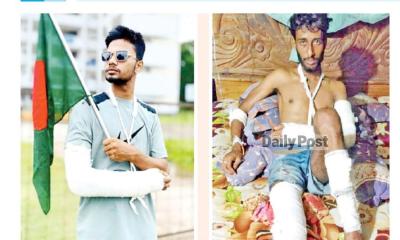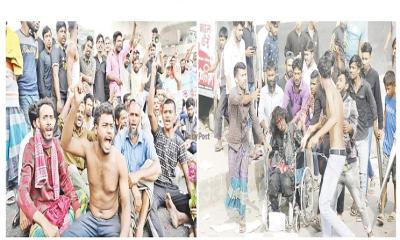- Govt agrees to dialogue within constitutional framework
- US envoy wants unconditional dialogue
Dialogue is main tool to resolve the crisis
Sarah Cooke , British High Commissioner
If crisis is not resolved through dialogue, the country will suffer
Prof. Dr. Nazmul Ahsan Kalimullah
Chairman, JANIPOP
If Prime Minister wants, she can take initiative in dialogue
Prof Dr. Sabbir Ahmed
Dept of Political Science, DU
After the rally in Dhaka on October 28, Bangladesh Nationalist Party (BNP) and Jamaat announced a one-day strike and three consecutive road, rail and waterway blockade programs. The ruling Awami League is also on alert on the streets to maintain its position. The party leaders and activists have been vocal in their opposition by announcing that they will take on the opposition parties politically. The normal functioning of the country is being hampered due to the face-to-face stand of the two opposition parties. Election experts and political analysts have not yet given up hope of dialogue to resolve the ongoing deadlock over the interim.
On November 1, Home Minister Asaduzzaman Khan Kamal again expressed hope after Prime Minister Sheikh Hasina ruled out all possibilities of dialogue on October 31. On October 31, the US ambassador to Dhaka called for unconditional dialogue after a meeting with the Chief Election Commissioner. Yesterday, the UK Ambassador to Dhaka also called for dialogue. As a result, the possibility of dialogue to resolve the political crisis is not over yet.
The election schedule will be announced this month, the Election Commission insists. All preparations have also been made for the national elections. The government is also providing all kinds of support to the commission. But most of the political parties of the country, including BNP-Jamaat-e-Islami, are not accepting the vote under this commission and the government. They are in the movement to hold elections under interim government.
On October 28, the opposition parties staged a massive show-off in Dhaka demanding a non-party government during the election, while BNP and Jamaat-e-Islami held a mega rally. The Awami League also held counter rallies to maintain its position. The showdown led to violence and loss of life. A mega rally of the opposition BNP was held. The BNP observed hartal in the morning and evening on Sunday claiming that the government had postponed the rally.
BNP and Jamaat have been observing a three-day blockade since Tuesday, taking a day's break on Monday. The Awami League has also announced a programme up to the election schedule. Political analysts say that if the two sides face each other on the streets, it will not be good for the country. Meanwhile, during the protests of the opposition, there was violence, there was an unknown panic among the common people. The leaders of rival political parties BNP and Awami League are making speeches claiming that each other is guilty.
Beyond politicians, the general public and civil society representatives do not think the situation is normal. Although it has been suggested to find a solution through dialogue to improve the situation, both sides have stuck to their respective positions. Analysts also fear that the country will be in crisis if the situation does not improve through dialogue in the end.
Meanwhile, US Ambassador to Dhaka Peter Haas held a meeting with the Chief Election Commissioner on October 31. The meeting was held at the Chief Election Commissioner's room at the Election Bhaban in Agargaon in the capital. In the meeting, Kazi Habibul Awal said, "If the environment is symbolic, elections will not be held, there should be no such misunderstanding among the people." The CEC said, "Peter Haas wanted to know how the election atmosphere was.
We have made it clear to him that we have no choice. The Election Commission has to hold elections as per constitutional obligations and on time. Political parties have different options. They may or may not participate in elections. They can contest 300 seats alone or even form alliances. They have options but the Election Commission has no such option. "I want to make it clear that the elections will be held within the stipulated procedure and within the stipulated time. We are in a strong position on this. ’
On the other hand, after the meeting with CEC Kazi Habibul Awal, US Ambassador to Bangladesh Peter D Haas expressed optimism that the parties will sit for unconditional dialogue to resolve the political crisis and find a way to hold free, fair and peaceful elections. "We want to see transparency and accountability in elections in accordance with international standards," the US ambassador said after the hour-and-a-half-long meeting.
British High Commissioner to Dhaka Sarah Cooke held a meeting with Home Minister Asaduzzaman Khan Kamal at the Secretariat yesterday. "The doors of the government's dialogue with BNP have not been closed, we are ready for any unconditional talks within the framework of the constitution," the minister told reporters after the meeting. Asked by reporters what he had discussed with the British High Commissioner, the home minister said there was no such conversation. "Dialogue is the main tool to resolve the crisis," she (The British High Commissioner) said. We have said that we always welcome dialogue.
We also believe that political problems should be resolved through dialogue. We have to have a dialogue according to the way the Constitution has structured us. Even Sarah Cooke admits this. He also said there was no alternative to dialogue. He also said that the problem should be resolved through dialogue with all stakeholders. It's not a suggestion, it's a conversation we've had.
"We want a peaceful environment, not violence. Asked if he was taking any initiative for dialogue, Asaduzzaman Khan Kamal said, "We will talk to those who come." We have to talk to them in accordance with the framework of the Constitution. If someone says something outside the Constitution, it won't happen.
When asked about the fact that you are in power and the opposition has to call you, he said, "Many people are coming. They're calling us when they need us. They can say we want to talk, we don't want a strike. They never said that. We're saying the door hasn't closed. We are willing to engage in any discussion, whether it is within the framework of the Constitution.
Prime Minister Sheikh Hasina held a press conference at Ganobhaban on Tuesday afternoon. A reporter asked if U.S. Ambassador Peter Haas had called for an unconditional dialogue about the election. What is the government's position on this? Prime Minister Sheikh Hasina has dismissed the idea of dialogue with BNP, calling it a party of killers. "Who will I hold dialogue with?" she asked. What's the dialogue with the killers?
National Election Observer Council (JANIPOP) Chairman Professor Dr Nazmul Ahsan Kalimullah believes that the country will suffer and the people of the country will be affected if both sides (government and opposition) do not resolve the political crisis by holding talks before the election. Quoting a speech given by US Ambassador Peter Haas in a meeting with the Chief Election Commissioner and other election commissioners, the political analyst said that Peter Haas talked about dialogue and compromise in a meeting with the EC. He also said that acts of violence are condemnable. He called for a solution to the problem through dialogue. Peter Haas's statement is not his personal opinion, it is the opinion of the international community. Talking to this reporter of Daily Post, Professor Kalimullah also said that after the incident of October 28 (clashes and violence), seven influential countries of the world have issued statements, they have expressed their condemnation as well as concern. At a press conference on October 31, the prime minister ruled out the possibility of dialogue. As a result, there is an uncertainty.
But it's really hard to solve the problem without dialogue. Dr Sabbir Ahmed, a professor of political science at Dhaka University, believes that Prime Minister Sheikh Hasina can take the initiative of dialogue to resolve the ongoing crisis in the country, but she does not seem to take this initiative now. I don't even have time to have a dialogue. The schedule will be announced only a few days later. Talking to this reporter of Daily Post, Dr Sabbir Ahmed said that BNP does not seem to go to the election if the election schedule is announced, so there may be a one-sided election. And if BNP does not go to the polls, they will want to stop the election. In that case, BNP will try to create a situation so that the election cannot be held. In that case, other law enforcement agencies, including the police, should be used to prevent any chaotic situation in the country.
JH






